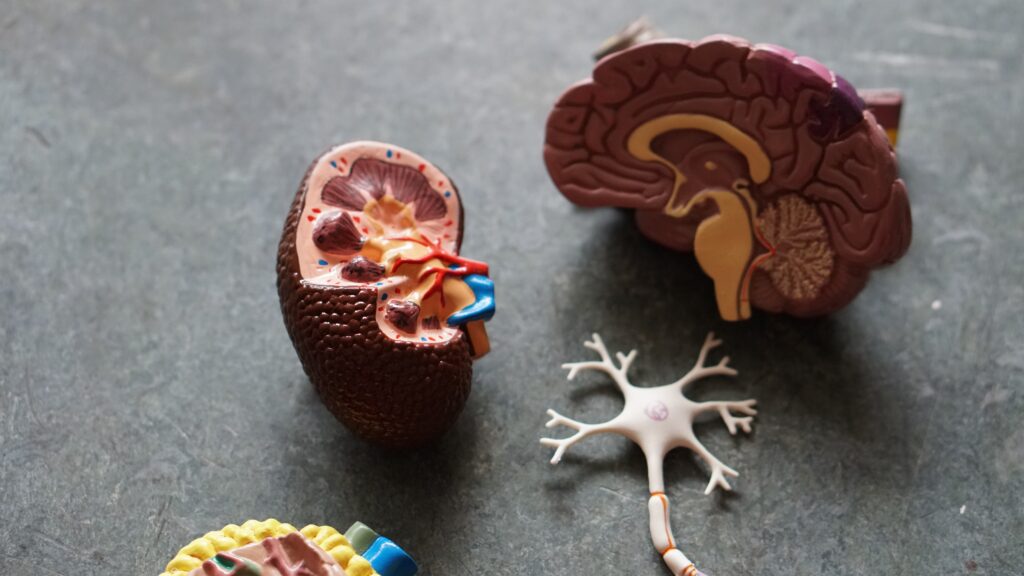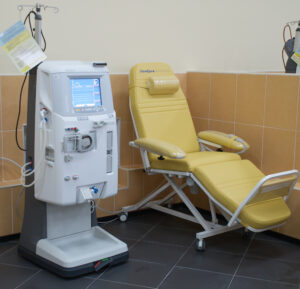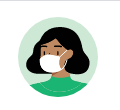Chronic Kidney Failure: Loss of kidney function over time

End-stage renal disease (ESRD) is a long-term medical condition in which the kidneys can no longer work properly.
If left untreated, ESRD can eventually lead to kidney failure. Some of the symptoms of ESRD, if present at all, include:
- Fatigue
- Swelling of ankles and feet due to fluid retention
- Nausea/vomiting
- Frequent urination
- Darkening of the skin around the eyes and on the legs.
ESRD can be treated with dialysis, which is a way to remove toxins from the blood, or a kidney transplant.
Early diagnosis has been shown to improve outcomes and length of life for people with ESRD, but it is still important to remember that kidney failure cannot be cured. However, it can be managed and treated successfully with the right care and management.
Causes of chronic kidney failure
Chronic kidney failure is a very serious health problem that can make life very hard.
It can be caused by a variety of lifestyle and hereditary factors, such as
- High blood pressure
- Diabetes
- Heart disease
- Kidney infections and
- An unhealthy diet
Chronic kidney failure can also be caused by your genes, and some ethnic groups are more likely to get it than others.
Kidney stones and some toxins can also make it more likely to happen. To keep the kidneys healthy and prevent this from happening, it’s important to stay away from these harmful things.
 Taking the steps you need to keep your health in good shape and seeing your kidney specialist doctor Javier Alfonso MD regularly can help reduce the long-term effects of any cause.
Taking the steps you need to keep your health in good shape and seeing your kidney specialist doctor Javier Alfonso MD regularly can help reduce the long-term effects of any cause.
Symptoms of chronic kidney failure
Chronic kidney failure is hard to diagnose because its early signs and symptoms can be mild or even impossible to notice.
But as the disease gets worse, other common signs may include muscle cramps at night and/or skin that itches or is dry.
It’s important to be aware of these potential warning signs so that prompt medical care can be sought out before any more serious complications set in. If you don’t treat chronic kidney failure for too long, it can lead to a whole host of other health problems.
Diagnosis of chronic kidney failure
Chronic kidney failure can be hard to figure out because the symptoms aren’t always clear.
Many individuals with the condition do not show signs in the early stages and can go undiagnosed until the later stages.
Chronic kidney failure can be diagnosed with a number of blood and urine tests that look for substances that can show a problem with the kidneys.
Ultrasound imaging can also be used to find problems in the kidneys. If more information is needed, a biopsy or CT scan may be done.
Due to how hard it is to figure out if someone has chronic kidney failure, it is important for people who might be at risk to talk to a doctor to rule out any other problems.
Treatment of chronic kidney failure
Chronic kidney failure is a debilitating condition that affects thousands of people each year.
Thankfully, a variety of treatments are available to help manage the disorder and improve the quality of life for those living with it.
 Dialysis remains the most common treatment option and can either be done at home or in a hospital several times per week, depending on medical factors.
Dialysis remains the most common treatment option and can either be done at home or in a hospital several times per week, depending on medical factors.
Furthermore, certain lifestyle changes, such as:
- Eating a healthy diet
- Limiting fluid intake
- And avoiding medicines that can cause further damage to the kidneys could be beneficial.
Even though there is no cure for chronic kidney failure, these treatments can help reduce physical symptoms and make it possible for people who have it to live full, active lives.
Prevention of chronic kidney failure
Chronic kidney failure is a serious but often preventable condition.
Taking a few small steps can help reduce the risk of developing this dangerous disease. For healthy kidneys, it’s important to drink a lot of water, work out regularly, and eat a well-balanced diet with less fat and sugar.
Also, it’s important not to take too many medications. You should only take medications as prescribed by a doctor, like Dr. Javier Alfonso, MD.
Lastly, the best way to avoid kidney damage is to have your doctor check you regularly for signs of it. With careful attention to health habits and regular doctor visits, chronic kidney failure can be kept at bay.
Overall, it is important to understand what chronic kidney failure is and the ways in which it can be prevented and treated.



To stay healthy and protect your kidneys, you need a diet that is balanced and full of nutrients, regular physical activity, less exposure to toxins in the environment, enough water, and the chance to live a healthy lifestyle.
When you have chronic kidney failure, it’s important to see a doctor as soon as you notice any symptoms. This can help reduce the chance of permanent damage or death.
Furthermore, if you are one of our patients, it is critical that you keep up with your scheduled visits with Dr. Alfonso if you notice any changes in your urine or if any new risk factors emerge.
If you are showing signs of chronic kidney failure or think you may be at risk, call Dr. Alfonso today to schedule a visit and receive quality care.
You may be interested in:
Patients in stage 4 Kidney disease
You don’t have to settle for dialysis or surgery. Get the most advanced care by the the best kidney doctor in Miami.
- Questions About Insurance?




New Patient Appointment:
We Do Not Share Your Information With Any Third Party.
Call our office to speak with a medical professional right away:
Call Now (toll free)



